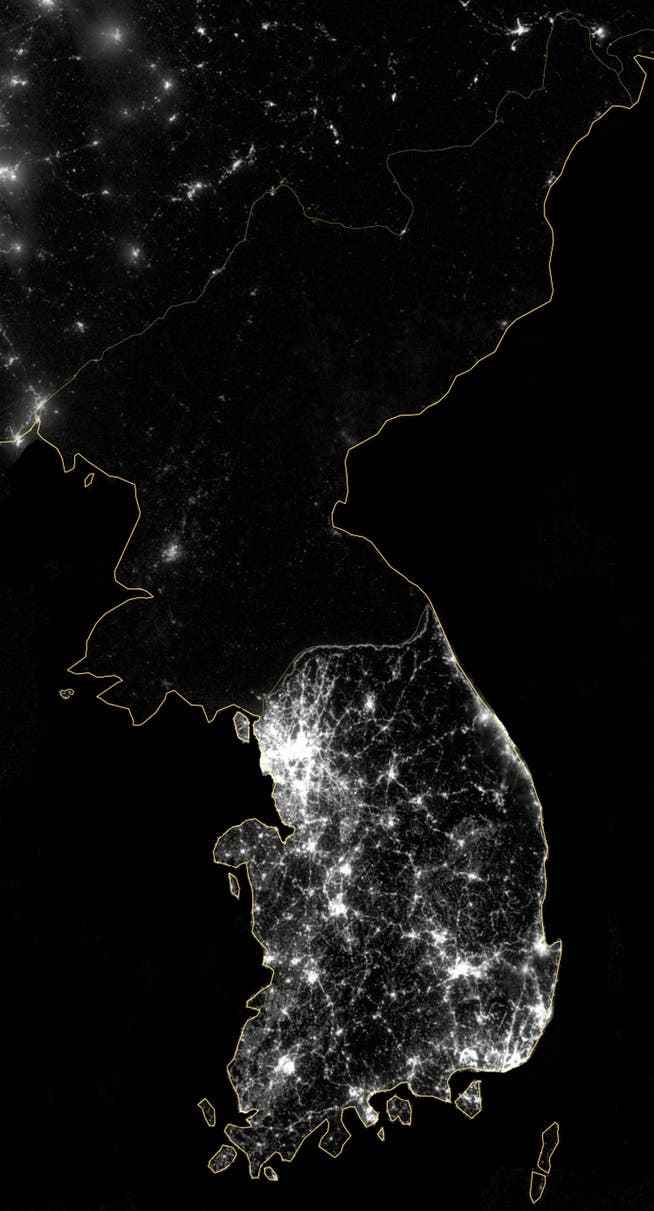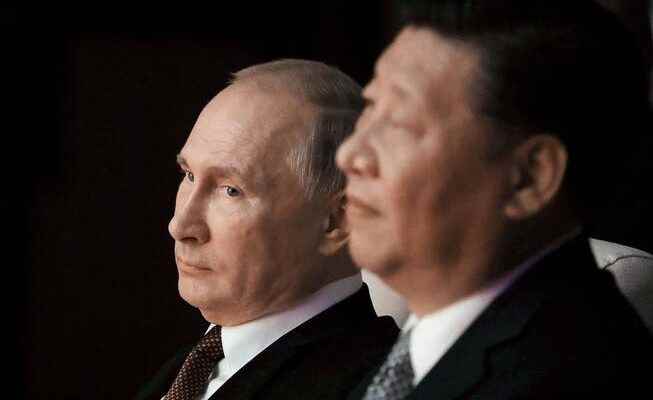The “strong man” fascinates: He is considered to be hands-on and capable, by virtue of his actions. He usually hides behind a facade of manipulation and mendacity. This is also shown by the illumination of authoritarian countries at night. These systems are therefore fragile.
Autocrats among themselves: Russia’s Vladimir Putin and China’s Xi Jinping.
It wasn’t planned that way. According to economists at the International Monetary Fund, Russia’s economic output could decline by 3.4 percent this year. This would make the country the only major economy with a decline in economic power. At the same time, the forecast for the Russian economy has improved more than for any other country compared to the July forecast – by as much as 2.6 percentage points.
In addition, the decline now forecast is far from the 10 percent drop in Russia’s gross domestic product that some economists had estimated at the beginning of the attack on Ukraine. And this despite the immense wave of sanctions that the West has unleashed on Russia.
No tedious political theater
Even the biggest proponents of the economic measures concede that the Central Bank of Russia is acting very skilfully and competently to stave off a financial and economic crisis in the country. At times there is also a kind of admiration for autocratic structures: No tedious political theater, as is usual in democracies, distracts from achieving a clear goal, they say.
Asian growth dictatorships, which, like in China, for a long time fulfilled the high expectations of economic growth almost to the point of the decimal point, almost evoked ecstasy. In contrast, some Western naysayers wallow in descriptions of how short-sighted and blinded democratic politicians are. This cannot always be dismissed out of hand. The most recent example is the government chaos in the United Kingdom, which likes to see itself as the motherland of a modern democracy.
Despots tend to exaggerate
However, democracies should put their achievements in perspective. And this is meant literally. Because autocrats sometimes lie when it comes to their growth figures. Of the Economist Luis Martinez he’s looking at something that can’t be faked: he’s using satellite imagery that measures countries’ illumination at night. This can be used as a benchmark for the economic development of countries. It is striking how dark North Korea is and how bright South Korea is at night.

North Korea is dark at night and South Korea is bright: satellite images shed light on the different economic development of these two countries.
Martínez compares reported gross domestic product figures to a country’s level of illumination and can use this to determine whether a country may be inflating its officially reported economic growth. When countries are classified according to their political constitution, the picture is clear: autocracies tend to exaggerate their annual economic growth by a good third compared with democracies.
In both political systems there are incentives to present oneself better. The difference is that this is easier to do in autocracies because there is no control from the public or the media, and because subordinates also use this means to fulfill the requirements of the autocrat at the top.
cause and effect
It is also noticeable that autocrats are more likely to report the “right” economic growth as long as the country is below a certain threshold and development funds are therefore flowing. Once the threshold is crossed, economic growth skyrockets as if controlled by magic. When the figures are corrected for this lie factor, Chinese growth, for example, still remains impressive, but significantly less than before. As a result, the distance to India’s economic development is shrinking considerably.
This also sheds new light on the old discussion of how economically successful undemocratic countries are. In the economic literature presented a few years ago an influential study states that democracy has a positive effect on per capita economic output. This question remains hotly debated because cause and effect are not so clear. Does democracy lead to more growth or vice versa? Singapore and China are examples of – at least for a long time – successful economic development with the “hard hand”.
Refuge from internal and external enemies
But for every autocracy that has grown rapidly, there are more than enough undemocratic countries that have failed. On the other hand, most rich countries are democracies – except for those whose prosperity is based on natural resources. Democratically governed countries invest more in the education of the population and in health care. They are better at providing economic stability. But authoritarian regimes often lead to an economic and political system that is fragile.
This collides with the myth that authoritarian rulers are competent. For example, the Kremlin ruler Vladimir Putin is said to be able to predict his opponent’s moves like a good chess player. But it’s not just the absurd statement that everything is going according to plan in the current war against Ukraine that scratches this image. The Russian economy has been stagnating for more than ten years. Previously, it had grown on the back of a commodity boom. The establishment of a diversified economy has not succeeded. The development of the EU member Poland shows how staying power democratic countries have in the face of the resource power Russia.
When current leader Xi Jinping took power in China, the country was enjoying a long period of sustained high growth. This has cooled down. Since then, the aura of forward-looking government has faded in the face of the restrictive zero-Covid policy, signs of economic weakness and the sluggish progress of the Silk Road initiatives. Unsurprisingly, both Xi and Putin focus on internal and external enemies.
manipulation of the information
Both autocrats have long cultivated the image of a competent ruler. Economists Sergei Guriev and Daniel Treisman argue that in recent decades a new type of autocratic ruler has emerged: instead of spreading fear and terror, he manipulates information by buying the silence of the elite, censoring it and spreading propaganda. In a globalized world with its gains in prosperity, cutting off a country’s cord, as under an “old” dictatorship, leads to high costs. It is better to impart competence and support economic growth with the help of a false pluralism.
However, economic success can throw an autocrat off course: a new, well-educated middle class usually demands more political rights. Increased propaganda, censorship, and scams like the growth numbers are helping to dampen the brunt of the demands — but probably not forever. But the opposite, when economic success dwindles, is also dangerous for the regime. One possible response for an autocrat is to tighten the screws of repression again.
Alarm bells should also ring when a ruler changes the constitution so that he can stay in office longer. This is an admission that Potemkin democracy or state institutions are at an end. This also makes it more difficult for an autocrat to appeal to members of the population who are willing to perform because the future is narrow for them.
Unattractive visions
The manipulation of information and the repression also have a fatal consequence: the autocrat finds it difficult to assess the mood of the population. This opens the floodgates for mistakes by the regime, which has to resort to even more mendacity. Democracies can already score with the fact that autocracies are often incompetent. This should have slowly gotten around. However, illusions about totalitarian systems have a long tradition: American textbooks already overestimated the growth of the Soviet Union between 1960 and 1980 at the time of the Cold War.
Current autocracies also exude unattractive visions: be it an Islamic theocracy, be it a revanchist military power that sees itself as a bulwark in defense of a conservatism distorted into a farce, be it techno-totalitarianism. What potentates have in their offer right now is a deterrent. However, it is not enough for liberal democracies simply to define themselves by what they are against. Rather, the very foundations of democratic elections, the rule of law, the market economy and freedom of expression should not be undermined. It is also important to make it clear what a democratic world should look like. Democracy has enough light, it just needs to shine brighter.
You can contact the business editor Gerald Hosp follow on twitter.
